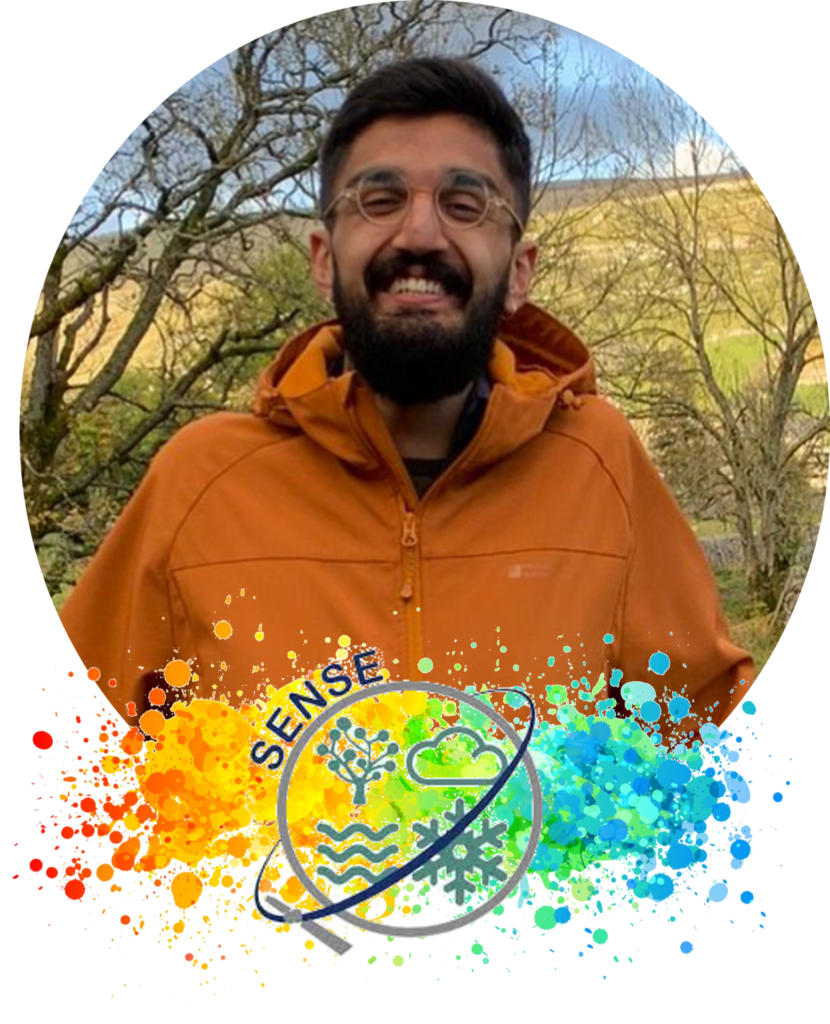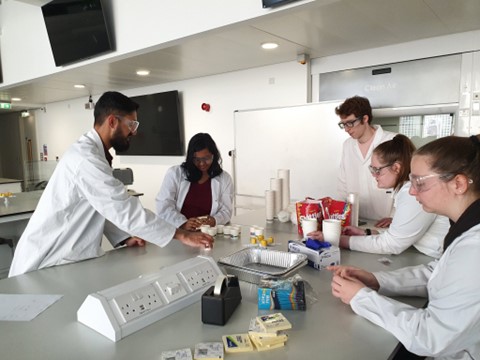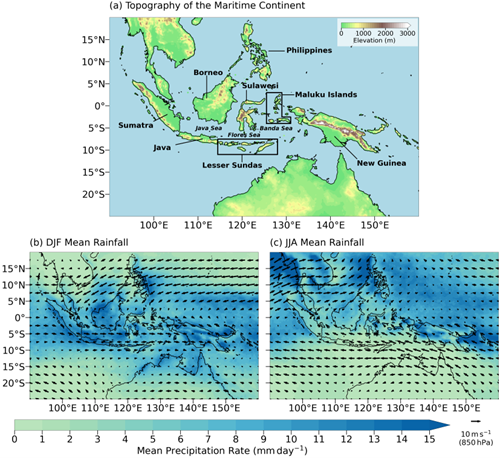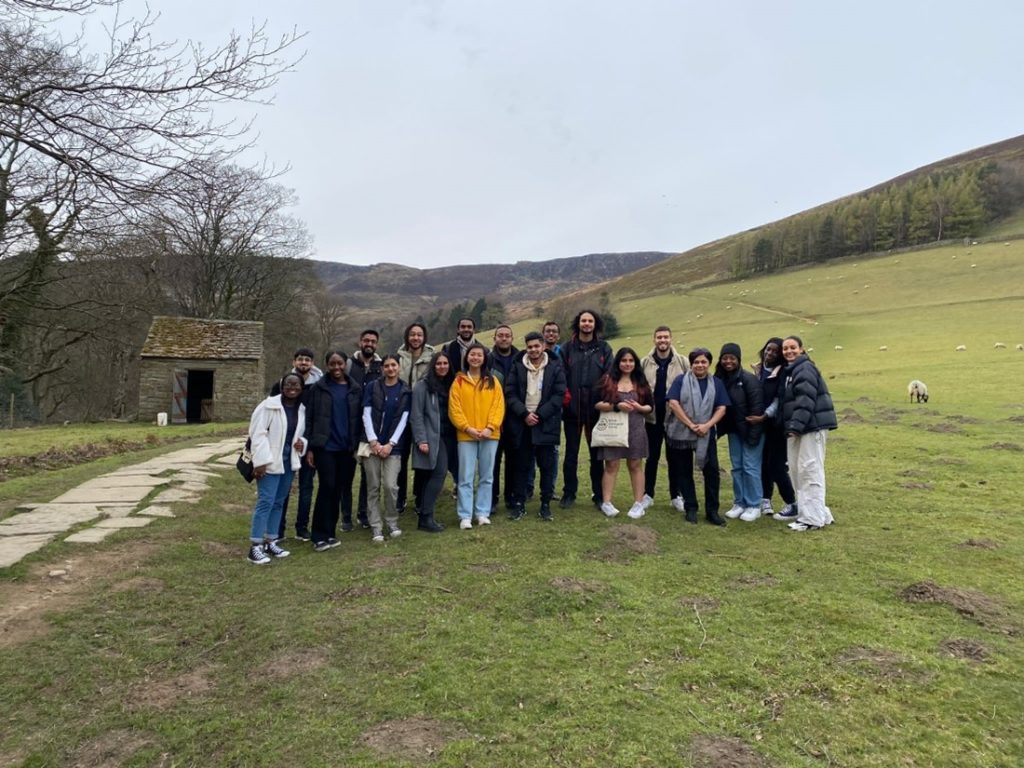Name: Ashar Aslam
Institution: Institute of Climate and Atmospheric Science, University of Leeds
PhD Project Title: Severe Weather over Southeast Asia

What is your background?
I’m a second year PhD student within the Atmospheric and Cloud Dynamics Group at the University of Leeds. My research focuses on improving the understanding of the processes influencing extreme rainfall patterns over the Maritime Continent, another name for the thousands of islands and many shallow seas in Southeast Asia. Prior to starting my PhD, I did an integrated Master’s in Earth Sciences at the University of Oxford. I identify as queer, neurodivergent, BAME (Pakistani heritage) and as someone from a lower socioeconomic background (in no particular order).
From January to March 2023, I have seconded from my PhD to work as one of SENSE’s EDI champions. I have been engaged with EDI and outreach work since I was an undergraduate. This includes development of educational resources for KS3 school pupils, supporting programmes aiming to better understand the barriers of underrepresented groups to geoscience at an undergraduate level, and being a guest speaker at conferences and podcasts related to topics associated with being LGBTQ+, a person of colour, integration within the STEM community, and disproportionate impacts faced by marginalised groups.

Tell us about your project and the area of environmental science you are most excited about
My research background is primarily in geology – during the latter stages of my undergraduate degree however, I specialised in more of the climate, ocean and atmospheric science portions of the course. I’ve always been interested in understanding extreme weather, particularly in the tropics. I stay away from declaring ‘fascination’ in topics such as natural hazards, given the detrimental impacts that communities face as a result. A major pet peeve when it comes to people documenting such events! I am primarily interested in understanding impacts for particularly more socioeconomically deprived regions, where the impacts are likely to be more felt, with climate change, for example, having a disproportionate (and often undeserved impact) on such groups.
I used to work on African climate model data for understanding reasons for biases in the representation of the regional meteorology, such as where you get anomalous rainfall. I now study the many processes influencing rainfall patterns over the islands of Southeast Asia. Such processes include the large-scale environmental field, the diurnal cycle of solar heating (unique to each island) and more transient/synoptic-scale phenomena such as tropical cyclones. As these processes all interact with one another, understanding the complex meteorology is very difficult. Limitations in our understanding mean that there are biases in current climate models because of this. They also mean these biases cannot be addressed without understanding the weather in its fullest form first – talk about a feedback loop! Given 400 million people live in Southeast Asia, understanding the meteorology is beyond important, as they are compounded with impacts such as flooding and landslides, leading todisplacement, loss, poor sanitation, epidemiological crises and death. This is just one of many sets of hazards affecting the region – it is also tectonically active, with earthquakes and volcanic eruptions occurring as well.

Was using satellite data at the core of your PhD project important to you?
Satellite data provides the foundations for my work – given it’s one of the most accessible, and high quality, sources of data, it is of great utility. It also supplements limited observational data, which is a big issue in Southeast Asia, in terms of the spatial distribution and density of meteorological stations, where, for example, radiosondes are deployed for determining atmospheric profiles, and where radars are for determining nearby rainfall distribution. In addition, it can be used in conjunction with models to confirm the presence of certain processes, or if biases exist in our models relative to that of observations, either obtained from the ground or from satellites. Luckily for me, a lot of the data has been pre-processed, so it saves me a lot of time!
Why did you decide to enter the space sector?
I don’t think entering the space sector was at all voluntary – I more or less stumbled upon it and thought, ‘hey great, this is cool’. But it is cool. I covered several space sector/satellite data topics in undergraduate, such as understanding active tectonics – though I didn’t realise how broad it truly was. You have geologists. Meteorologists. Ecologists. Glaciologists. Data scientists. All in one place. The space sector also has such a big tie with industry. Supporting efforts with Space Hub Yorkshire during the summer prior to starting my PhD really opened my eyes to how big the sector is, and what can be gained from it. Business jargon? Sure, there’s that, and sometimes I get confused, but you can get your head round it. It’s a very inter-disciplinary sector and it’s good to get experience in each area.
What does equity, diversity and inclusion mean to you, and what will you be doing as EDI champion?
Equity, diversity and inclusion is a celebration – but it’s also a battle. A celebration in that people from all walks of life can come together, showcase who they truly are and flourish in whatever environment they’re placed in. On the contrary, it’s a battle as EDI is very much becoming a buzzword acronym, chucked around without an in-depth evaluation of what it means, and what you should do to ensure the workplace is as inclusive as possible. Oftentimes, implementation of such best practices is restricted by limited commitments to the cause we fight for. EDI is a removal of barriers – barriers is another word I dislike as it implies almost permanent hindrances to your progress. Replace the word with obstacles, and you have difficulties that you can navigate around, provided the support is there.
In the role of EDI champion, I am supporting initiatives run by SENSE in tackling EDI issues. This includes analysing and assessing current EDI practices, designing new initiatives and evaluating their efficacy for implementation in both the PhD application process and postgraduate student support services. It also involves the production of showcases, toolkits, webinars, running of well-being activities and mentoring, and dissemination of results through open-source presentations and resources. Through this work, SENSE hope to highlight the necessary best practices for recruitment and supporting researchers throughout their PhD, linking with NERC’s ongoing efforts to improve the ways in which EDI is approached. We will be showcasing what the CDT has done and what it has to offer, and how we are doing our best, and constantly bettering our efforts, in making the environment more accessible and equitable.

What are your hopes for future PhD students?
This is beyond cliché but for future PhD students to pursue their dreams, either within or outside academia. They should be allowed to engage in research without being pressured to do too much and being forced down a niche they don’t necessarily enjoy. Funneling a student’s mind is detrimental, and limits their freedom to think. The process should be as comforting and inclusive as possible, and I hope that support networks will be provided without the need for discussion around the topic.
Any tips for those interested in applying for PhDs?
PhDs are hard work, but they can provide high rewards. Ensure you find a supervisor team that aligns with your interests, both academic and personal, as you’ll be working with them for around 4 years! Also remember that you can shape the path of your research – if you’re not enjoying it, you can vocalise it and the team will listen to you. Though there are alternative career routes after graduating from your undergraduate, it can be nice to engage with work that you can, in areas, lead yourself, even if you feel at the base of the academic pyramid.
Any tips for those interested in engaging more with EDI?
With EDI, it’s a matter of testing things out and seeing what works for you. For example, you may be of a particular underrepresented group, but that doesn’t mean you have to do the brunt of the work simply because of lived experiences. Similarly, you don’t have to belong to a particular underrepresented group, but you should do your best to be aware of issues faced by those groups, and how to exercise allyship in the best way possible. Simply put, understand your boundaries while also understanding the boundaries of others. EDI isn’t a competition – we’re all working together.
Read more about Ashar here.
Follow Ashar on Twitter @Ashar_A_Aslam



